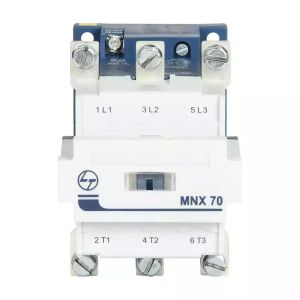
Industrial automation is a key driver of modern manufacturing, improving efficiency, reducing costs, and enhancing product quality. At the heart of many automation systems are motor contactors, which play a crucial role in the reliable operation of electric motors. Understanding how motor contactors enhance industrial automation can help businesses optimize production processes and maintain a competitive edge.
Understanding Motor Contactors
A motor contactor is an electrically controlled switch used for switching an electrical power circuit. It is typically used to control electric motors, lighting, heating, capacitor banks, and other electrical loads. The contactor is operated by an electromagnetic coil, which, when energized, closes the contacts and allows electricity to flow through the circuit.
Key Components of Motor Contactors
- Contacts: These are the conducting parts that open and close the circuit. There are usually three types of contacts: power contacts, auxiliary contacts, and contact springs.
- Electromagnetic Coil: This coil, when energized, creates a magnetic field that pulls the contacts together, completing the circuit.
- Enclosure: This provides insulation and protection for the internal components of the contactor.
Types of Motor Contactors
Motor contactors come in various types to suit different applications:
- AC Contactors: These are used for alternating current (AC) applications and are common in industrial environments.
- DC Contactors: These are designed for direct current (DC) applications.
- Definite Purpose Contactors: These are used for specific applications such as HVAC systems, refrigeration, and compressors.
The Role of Motor Contactors in Industrial Automation
Motor contactors are integral to the functionality of automated systems. They provide several benefits that enhance industrial automation:
1. Improved Motor Control
Motor contactors provide precise control over electric motors, enabling automated systems to start, stop, and reverse motors with accuracy. This level of control is essential for applications that require precise timing and coordination, such as conveyor belts, robotic arms, and automated assembly lines.
2. Enhanced Safety
Safety is a critical concern in industrial environments. Motor contactors contribute to safer operations by providing reliable disconnection of electrical power in case of overloads or short circuits. They are often integrated with overload relays and other protective devices to ensure that motors do not overheat or become damaged, reducing the risk of fire and electrical hazards.
3. Increased Efficiency
Automation systems that use motor contactors can operate more efficiently. Motor contactors enable quick and smooth switching of motors, reducing downtime and minimizing energy consumption. This efficiency translates to higher productivity and lower operational costs.
4. Remote Operation
Motor contactors can be controlled remotely, allowing operators to manage machinery from a central location. This capability is especially valuable in large manufacturing plants where the manual operation of each motor would be impractical and time-consuming. Remote control also facilitates the integration of motor contactors into sophisticated automation systems and smart factories.
5. Scalability
Motor contactors are available in various sizes and ratings, making them suitable for both small-scale and large-scale industrial applications. This scalability allows businesses to expand their operations and upgrade their automation systems without the need for significant modifications.
Applications of Motor Contactors in Industrial Automation
Motor contactors are used in a wide range of industrial applications:
1. Manufacturing
In manufacturing plants, motor contactors control machinery such as conveyor belts, robotic arms, and CNC machines. These machines require precise control and coordination, which motor contactors provide.
2. HVAC Systems
Heating, ventilation, and air conditioning (HVAC) systems use motor contactors to control compressors, fans, and pumps. Reliable operation of these components is essential for maintaining optimal environmental conditions in industrial facilities.
3. Water and Wastewater Treatment
Motor contactors are used to control pumps, blowers, and mixers in water and wastewater treatment plants. These systems must operate reliably and efficiently to ensure the safe and effective treatment of water.
4. Mining and Heavy Industries
In mining and heavy industries, motor contactors control large motors that drive equipment such as crushers, mills, and conveyors. These applications require robust and durable contactors that can withstand harsh operating conditions.
5. Renewable Energy
Motor contactors play a role in renewable energy systems, such as wind turbines and solar power plants, where they control the operation of motors and other electrical components.
The Future of Motor Contactors in Industrial Automation
As industrial automation continues to evolve, motor contactors are expected to play an increasingly important role. Advances in technology are leading to the development of more intelligent and connected motor contactors that offer enhanced features and capabilities.
1. Integration with IoT
The Internet of Things (IoT) is transforming industrial automation by enabling devices to communicate and share data. Motor contactors with IoT capabilities can provide real-time monitoring and diagnostics, allowing operators to detect issues early and perform predictive maintenance.
2. Energy Efficiency
Energy efficiency is a growing concern in industrial automation. Modern motor contactors are being designed to minimize energy losses and improve the overall efficiency of electrical systems. This focus on energy efficiency helps businesses reduce their carbon footprint and operational costs.
3. Enhanced Reliability
Reliability is crucial for industrial automation systems. Future motor contactors are expected to offer enhanced durability and reliability, reducing the need for maintenance and minimizing downtime.
4. Smart Features
Smart motor contactors with advanced features such as self-diagnostics, adaptive control, and fault prediction are becoming more common. These features enhance the performance and reliability of automated systems.
Conclusion
Motor contactors are essential in industrial automation, providing precise control, enhanced safety, increased efficiency, and scalability. As technology advances, motor contactors are becoming more intelligent and connected, offering even greater benefits to industrial operations. Lauritz Knudsen Electrical & Automation is at the forefront of this innovation, providing high-quality motor contactors that enhance the performance and reliability of automated systems. By integrating these advanced contactors into their operations, businesses can achieve greater productivity, safety, and efficiency in their industrial processes.



